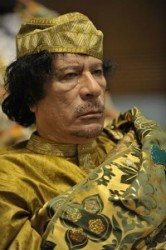Only a society built on Libyan culture and values has any chance to bring peace and democracy to that nation after years of abuse under dictator Moammar Gadhafi, says a Vanderbilt University professor who is advising the new government there.
“What we don’t need is a brigade of bureaucrats marching over there to try and take over,” said Mike Newton, professor of the practice of law at Vanderbilt Law School. “We need lean, targeted, expert assistance with the United States in the lead as promised by President Obama.
“The secret to successful institution building is the integration of international experts into the fabric of the institution from its inception so that they are positioned both to earn the trust and loyalty of Libyan colleagues, but also to influence policy as the Libyans attempt to merge their traditions with the obligations incumbent upon a new Libyan system grounded in fundamental respect for the rights of all Libyans.”
Newton was the senior member of the team that taught international law to the first group of Iraqis who began to think about accountability mechanisms and a constitutional structure in 2000. A former Army lawyer, he has worked on justice issues in Iraq, Haiti, Afghanistan, Kosovo, Sri Lanka, Kenya, Uganda and other nations.
Gadhafi, who ruled Libya for four decades after overthrowing the government in a 1969 military coup,

was captured and killed Oct. 20 as he attempted to flee his hometown of Sirte. Rebels took over the capital of Tripoli two months earlier. During his rule, he violently squashed dissent and reportedly supported terrorism, financed by Libya’s vast oil reserves.
Trials are important for the remaining members of Gadhafi’s government, Newton said.
“Much more important is the establishment of institutions that are built on Libyan culture and Libyan unity,” Newton said.
Two timelines must be minded equally during the process, he said. In the short term, the new government must demonstrate tangible progress that benefits all Libyans and reassures them that the Gadhafi regime is gone forever. Down the road, leaders must build enduring institutions that have the confidence of the people.
“It would be a fundamental mistake to ask Libyans to accept that a better future lies ahead just based on blind faith that may not be realized for years to come,” Newton said. “They need to see demonstrable progress toward a system built on respect for basic human rights irrespective of tribal lines, region or religion.”
